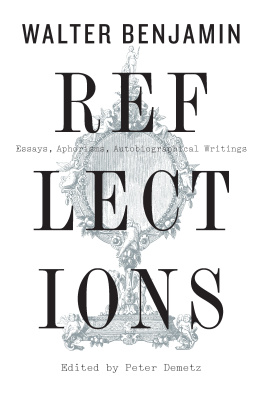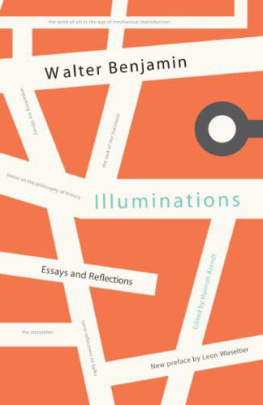Benjamin Walter - Textual Conspiracies Walter Benjamin, Idolatry, and Political Theory
Here you can read online Benjamin Walter - Textual Conspiracies Walter Benjamin, Idolatry, and Political Theory full text of the book (entire story) in english for free. Download pdf and epub, get meaning, cover and reviews about this ebook. City: Ann Arbor;Michigan, year: 2014, publisher: University of Michigan Press, genre: Religion. Description of the work, (preface) as well as reviews are available. Best literature library LitArk.com created for fans of good reading and offers a wide selection of genres:
Romance novel
Science fiction
Adventure
Detective
Science
History
Home and family
Prose
Art
Politics
Computer
Non-fiction
Religion
Business
Children
Humor
Choose a favorite category and find really read worthwhile books. Enjoy immersion in the world of imagination, feel the emotions of the characters or learn something new for yourself, make an fascinating discovery.
- Book:Textual Conspiracies Walter Benjamin, Idolatry, and Political Theory
- Author:
- Publisher:University of Michigan Press
- Genre:
- Year:2014
- City:Ann Arbor;Michigan
- Rating:3 / 5
- Favourites:Add to favourites
- Your mark:
- 60
- 1
- 2
- 3
- 4
- 5
Textual Conspiracies Walter Benjamin, Idolatry, and Political Theory: summary, description and annotation
We offer to read an annotation, description, summary or preface (depends on what the author of the book "Textual Conspiracies Walter Benjamin, Idolatry, and Political Theory" wrote himself). If you haven't found the necessary information about the book — write in the comments, we will try to find it.
Textual Conspiracies Walter Benjamin, Idolatry, and Political Theory — read online for free the complete book (whole text) full work
Below is the text of the book, divided by pages. System saving the place of the last page read, allows you to conveniently read the book "Textual Conspiracies Walter Benjamin, Idolatry, and Political Theory" online for free, without having to search again every time where you left off. Put a bookmark, and you can go to the page where you finished reading at any time.
Font size:
Interval:
Bookmark:

Copyright by the University of Michigan 2011
All rights reserved
This book may not be reproduced, in whole or in part, including illustrations, in any form (beyond that copying permitted by Sections 107 and 108 of the U.S. Copyright Law and except by reviewers for the public press), without written permission from the publisher.
Published in the United States of America by The University of Michigan Press
Manufactured in the United States of America Printed on acid-free paper
Printed on acid-free paper
2014 2013 2012 2011 4 3 2 1
A CIP catalog record for this book is available from the British Library.
Library of Congress Cataloging-in-Publication Data
Martel, James R.
Textual conspiracies : Walter Benjamin, idolatry, and political theory / James R. Martel.
p. cm.
Includes bibliographical references and index.
ISBN 978-0-472-11772-7 (cloth : alk. paper)
ISBN 978-0-472-02819-1 (e-book)
1. Benjamin, Walter, 18921940Political and social views. 2. Capitalism. 3. Liberalism. 4. Conspiracies. 5. Politics and literature. I. Title.
PT2603.E455Z73315 2011
838'.91209dc22 2011007220
I want to express thanks to many people who helped me to write this book. Two people in particular merit great thanks for this book's publication. Joyce Seltzer has been an invaluable friend, advisor, and mentor in facing the publishing world and conceptualizing my projects, this one very much included. Melody Herr has been a phenomenal editor; her advice, enthusiasm, and advocacy have made getting this book to press a truly enjoyable experience. Susan Cronin, Kevin Rennells, and Mike Kehoe have also been very helpful at University of Michigan Press. I also want to thank my university, San Francisco State University, and especially my dean, Joel Kassiola, for giving me a sabbatical to help finish this project and for his support in general. Jodi Dean was instrumental in starting this project; she got me thinking about conspiracy in the first place and has been an astute and generous reader. Karen Feldman has also been a great reader and was present at the first incarnations of my work on Kafka.
In October 2010, I was fortunate to be able to present the principal arguments for this text at a conference entitled Dangerous Crossings: Politics at the Limits of the Human, held at Johns Hopkins University. Thank you to the conference organizers: Drew Walker, Nathan Gies, Katherine Goktepe, and Tim Hanafin. Thanks also to Jennifer Culbert, Jane Bennett, Willam Connolly, and Bonnie Honig for their excellent comments and contributions to my project as well as their friendship. Other readers, colleagues, allies, and friends include, as always, Nasser Hussain and Mark Andrejevic, and many other people whose support and wisdom are invaluable to me: Marianne Constable, Ruth Sonderegger, Jackie Stevens, Martha Umphrey, Paul Passavant, Angelika von Wahl, Melissa Ptacek, Tiffany Willoughby-Herard, Sara Kendall, Wendy Lochner, Jeanne Scheper, Zhivka Valiavicharska, Jimmy Casas Klausen, Alex Dubilet, Ramona Naddaff, Lisa Disch, Stephanie Sommerfeld, Adam Thurschwell, Kennan Ferguson, David Bates, Shalini Satkunanandan, Stuart Murray, Anatole Anton, Sandra Luft, Anatoli Ignatov, Miguel Vatter, Libby Anker, Alex Hirsch, Vicky Kahn, Keally McBride, Dean Mathiowetz, Brian Weiner, Ron Sundstrom, Kate Gordy, Wendy Brown, Kyong-Min Son, William Sokoloff, Vanessa Lemm, Tom Dumm, Peter Fitzpatrick, Colin Perrin, Austin Sarat, Linda Ross Meyer, and many others. I want to thank my many students in my two (to date) Walter Benjamin graduate seminars at SFSU including Loren Lewis, Evan Stern, Rion Roberts, Steven Swarbrick, Sharise Edwards, Tyler Nelson, Dieyana Ruzgani, Loren Stewart, Katrina Lappin, Veronica Roberts, Kenny Loui, Joshua Hurni, Cecily Gonzalez, Rebecca Stillman, Randall Cohn, Brooks Kirchgassner, and quite a few others. Finally I want to thank my wonderful family: my husband, Carlos, my children, Jacques and Rocio, and Nina, Kathryn, Elic and Mark, Ralph, Huguette, Django, and Shalini.
I give thanks to my mother, Huguette Martel, for her painting that is used on the book cover. Thanks also go to Alice Martin at Service IMEC Images (which holds the Gisle Freund archives) and to Julie Galant at Fotofolio (the company that made the postcard that the image came from). I also thank Rich Stim, who did the research figuring out how to obtain permission, and Javier Machado Leyva, who photographed the painting and prepared the electronic file for use here.
An earlier version of appeared as Machiavelli's Public Conspiracies, in Media Tropes 2, no. 1 (2009): 6083.
What does it mean to be a leftist in our time? There are those who still call for and believe in revolutionthose, that is, who conform to an earlier version of the Leftbut more widely, it seems safe to say, few think such an event will occur in our lifetime. In this moment in time, it seems that for most people such a revolution is impossible, nearly unthinkable. When we speak of revolution today in much of the world, we generally mean the creation or restoration of liberal democracy, not the overthrow of capitalism. The overthrow of Hosni Mubarak and other events currently sweeping across the Middle East and North Africa may deservedly be called revolutions. They have been thrilling and promise a justice that is long overdue. But there is little or no expectation that the dictators being challenged are going to be replaced by any kind of radically democratic, anticapitalist political arrangements. These revolutions are not of that kind. While there have been moments in Egypt, Tunisia and Libya where truly spontaneous, decentralized resistance movements came into being, overall such movements have been absorbed into normalizing discourses of sovereignty and market order. Without the immanent possibility of radical revolutionthe central theme that animated the Left for much of its early historydirect and explicit opposition to capitalism becomes murkier and more diffuse. The Left, such as it is, exists today in pieces and tatters. There is an important subculture of resistance in terms of opposition, for example, to the World Trade Organization. Examples of guerrilla theater, large and disruptive demonstrations, and other forms of protest have gained widespread media attention. There are a handful of countries, such as Cuba and (to a lesser degree) Bolivia, where opposition to capitalism remains entrenched, at least ideologically. There are also (as this book will argue further) an infinite number of microresistances and oppositions to capitalism that appear in the most ordinary and unexpected places. Yet, for all of this, capitalism goes largely unchallenged; it has been knocked back on its heels, to be sure, by the recent and massive Great Recession, but it has been down before, and capitalism, and the political forces that accompany it (traditionally liberal democracies, but now increasingly, authoritarian states such as China and Russia as well) have proven fantastically adept at changing with the times.
Against many predictions of its demise (even many from liberals) capitalism has not only survived but thrived into the twenty-first century. It could be argued that capitalism today enjoys a monopoly of unopposed, unrivaled political, economic and social primacy that it has never had before, this not so much in terms of the end of history predicted by figures like Fukuyama (a perusal of any newspaper today will quickly dispel that idea) but rather in terms of serious challenges to capitalism as a totalizing norm, a global way of life.
Font size:
Interval:
Bookmark:
Similar books «Textual Conspiracies Walter Benjamin, Idolatry, and Political Theory»
Look at similar books to Textual Conspiracies Walter Benjamin, Idolatry, and Political Theory. We have selected literature similar in name and meaning in the hope of providing readers with more options to find new, interesting, not yet read works.
Discussion, reviews of the book Textual Conspiracies Walter Benjamin, Idolatry, and Political Theory and just readers' own opinions. Leave your comments, write what you think about the work, its meaning or the main characters. Specify what exactly you liked and what you didn't like, and why you think so.













